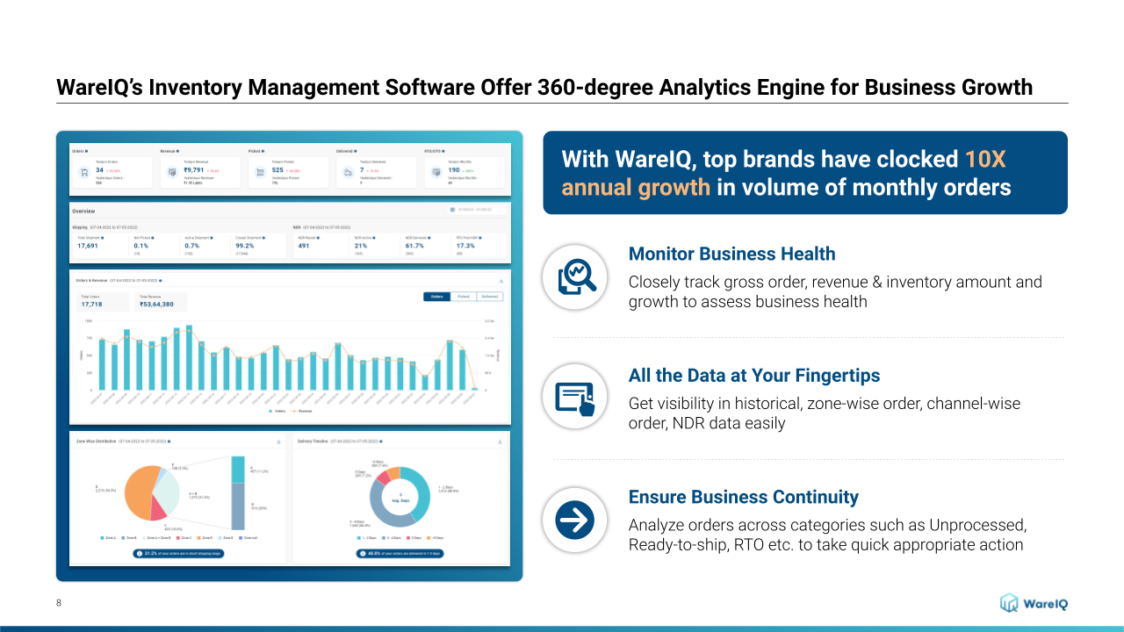Why Should Offline Retailers Switch to Online Selling in 2026? 13 Significant Benefits of Selling Online

Anyone may now establish their own online business in as little as a few minutes, thanks to the Internet, which has given everyone the power to dream big. eCommerce is a vast global marketplace where people can buy and sell goods and services online. It also functions as a successful business strategy that enables retailers to reach their target market on a global scale.
If you’re considering opening an online store, know that global retail eCommerce sales surpassed $4.9 trillion in 2021 and that, according to eMarketer, they will reach more than $5.5 trillion by the end of 2023. So it might turn out to be one of your wisest choices ever.
Discovering the benefits of online selling will help you choose whether this is the best business model for you. You’ll be able to stay inspired and enthusiastic throughout your entrepreneurial journey thanks to these benefits of doing business online.
- Why Should You Switch to Online Selling in 2026?
- 13 Significant Benefits of Online Selling
- Shorter Go-To-Market Timeframes
- Low Operational Costs
- Potential to Generate Revenue 24/7
- Bring in New Clients
- Simpler Purchasing Process
- Comprehensive Product Listing
- Broader Customer Base
- Strategize for Content Marketing
- Create Personalized Experience
- Retargeting or Remarketing to Customers is Simple
- Customer Data Insights
- Scalability
- Boosted Profit Margin
- WareIQ as a Fulfillment Partner
- Benefits of Online Selling FAQs: Frequently Asked Questions
Why Should You Switch to Online Selling in 2026?
Customers in our digital age need quick response times, round-the-clock support, and immediate access to goods and services. Customers between the ages of 18 and 29 and between the ages of 30 and 39 purchase online at least once weekly, respectively. By 2026, experts estimate that global retail eCommerce revenues will surpass $5.5 billion.
Given these details, it should be no surprise that many businesses are shifting their activities online. Compared to more conventional techniques, this enables them to expand their brand awareness and reach a global audience for much less money.
It costs less time and money to set up a website, show your products, and advertise online than to maintain a physical store. In addition, digital technology can help you create better customer experiences by streamlining your eCommerce business operations. Examples include eCommerce and retail apps, deep learning algorithms, chatbots, and marketing automation systems.
The benefits of online selling have gone beyond time and money savings. If you take this route, you’ll find it simpler to compete with more prominent companies and market your goods to a global market. Utilizing client data also allows you to enhance your offers and marketing initiatives. Advertising platforms like Facebook Ads, Google Adwords, and others offer thorough insights into consumer behavior, preferences, purchasing power, and more.
WareIQ, an eCommerce fulfillment company, empowers online brands with a superior-tech platform to compete with Amazon like service levels by bringing their average delivery timelines from 5-10 days to 1-2 days.
13 Significant Benefits of Online Selling
Selling online is an excellent way to increase your business’s reach, whether you currently have a physical storefront or are just starting eCommerce. Here are compiled thirteen benefits of online selling to assist you in deciding if doing so would be advantageous.
Shorter Go-To-Market Timeframes
In contrast to traditional retail, your eCommerce store might be up and running in just a few clicks. Pre-made templates design your store on eCommerce platforms like Squarespace, Shopify, and BigCommerce. They handle hosting, PCI compliance, platform maintenance, and other tasks. Creating an account is necessary to sell on online markets like Amazon or Flipkart.
These SaaS-based eCommerce platforms have made it feasible and easy for business owners to build appealing and dependable sites with little work during the past few years. You can sometimes launch a professional website without technical or eCommerce skills. So, you may see significant growth before you think about internal resources or hire a digital firm to advance your website.
eCommerce solutions allow you to launch rapidly, especially if you already have a social media following or have built up word-of-mouth. It is possible to launch a website rapidly and subsequently increase traffic to it, which is one of the benefits of online selling as compared to brick-and-mortar selling.
Low Operational Costs
Launching an online store is far less expensive than creating a physical store, which is one of the benefits of online selling. You are not required to outfit your business, pay rent, or hire several employees. Campaigns for marketing and advertising are very reasonably priced. The internet gateway is also mechanised and computerised, saving a lot of money. The lack of a middleman, which results in significant cost savings, is one of the main advantages of online commerce. Since the platform creates a direct relationship between customers and suppliers, it can create an effective supply chain.
Potential to Generate Revenue 24/7
eCommerce also has the benefit of having open 24/7 internet stores. You can draw someone’s attention at any time, anywhere in the globe, with Facebook ads. Contrarily, most physical stores are open from 10 a.m. to 8 p.m., offering you a competitive advantage. Being accessible 24/7 will help you draw customers who would otherwise shop at nearby stores if the outlet were open.
Consider your audience’s non-traditional or busy work schedules while designing your message. For example, you can draw in customers with unpredictable work schedules or little free time with an online store.
What about nighttime clients who place orders? So you don’t require night shift workers to fulfil their needs. All you have to do to give your consumers peace of mind is automate your ordering processes, so they get an email confirmation when they place an order.
Bring in New Clients
eCommerce selling can take on various formats, as already mentioned. Sellers can connect with a specific audience through each channel. You can reach overseas customers by creating an online presence. Social media platforms can reach new audiences. The largest audience is offered through marketplaces like Amazon, but you can also use them to identify niche markets. Marketplaces like Poshmark, Newegg, and Etsy cater to consumers looking for particular products. The best aspect is that you may simultaneously engage numerous audiences by utilising a variety of web touchpoints.
One of the benefits of online selling channels is that they aren’t constrained by who can physically visit your store, unlike brick-and-mortar ones. You can now contact someone online that you couldn’t previously, whether you’re a new or established seller.
Simpler Purchasing Process
Even if a buyer only wanted to buy one thing, he had to schedule his entire shopping excursion in advance. This will involve changing his schedule and going to the store to make the buy. Therefore, one of the vital benefits of online selling is that it expedites the purchasing process.
One no longer needs to travel to the outlet from home. Instead, relax while conducting a product search from the convenience of your home or place of employment, then finish placing the order.
Additionally, one can shop whenever they like because internet retailers are available every day of the week, 24 hours a day. eCommerce enables the user to buy a particular product quickly by offering a variety of possibilities.
Comprehensive Product Listing
A crucial component of eCommerce is that customers want a thorough overview of the products they want to buy. Therefore, customers of an eCommerce platform have access to a product catalogue with details outlining all of the company’s goods and services.
The specifications, utility, and qualities are thorough. Even the colours of some products are specified so you can choose depending on personal desire. In addition, customers can gain more information not available in retail outlets, such as the contents of culinary items.
Customers can purchase the things they want more easily when readily available knowledge. Online websites also offer reviews and user comments that educate customers about a product’s viability on the market. In addition, a consumer may find the portal’s warranty details and other product-related terms and conditions helpful.
Broader Customer Base
A physical store is situated in a specific neighbourhood, and often, locals can only visit to shop there. Amongst other benefits of online selling is that it is not geographically restricted.
When conducting business online through eCommerce stores, geographic boundaries become unimportant. Customers from all over the world who shop online can buy your products. You are not limited to customers who can walk to your physical location. The retail establishment has access to previously unexplored niche markets thanks to the Internet. You can reach customers in several ways by utilising numerous internet touchpoints, such as forums and social media.
A customer can use a computer with the necessary operating system and an internet connection to access the portal anywhere.
Strategize for Content Marketing
You may give your customers more details about your goods and services by having an online presence. A branded website gives sellers a platform to deliver customers important content.
In-depth product descriptions, product comparisons, in-store inventory availability, and pricing are some examples of crucial product content. Both in-person and online shoppers can use this information to guide their decisions.
Your eCommerce website might offer extra details about your company or demonstrate how to use your products. For example, your brand’s history and the manufacturing process can be highlighted on websites and through email marketing. Videos and blog articles can also offer helpful information about using your goods or services. Find out more about how content marketing may boost online sales.
Create Personalized Experience
Personalizing a website can improve the online shopping experience. Developing customised landing pages for various audiences is one of the main benefits of an online selling business. With little additional effort, this might persuade them to buy from you. It’s not like welcoming consumers into an actual store, whom you must take care of immediately. When you start marketing to your consumer base, you may relax after putting in all the hard work upfront.
Additionally, you can customise the experience you offer through email marketing campaigns. For example, consider segmenting your email lists based on a customer’s geography, past purchases, or how much they spent. Another suggestion is to retarget visitors to your online business by advertising a product they placed in their cart but later forgot about.
Product bundles can enable customers to purchase more items at a reduced cost, raising the average order value. Additionally, you can tailor upsells to the customer based on what they have looked at or what you believe they might like based on their purchasing patterns.
Retargeting or Remarketing to Customers is Simple
One of the most lucrative benefits of online selling is how simple it is to develop retargeting advertisements to target local clients when operating an online business. To show ads to potential clients in their Facebook feeds, you can establish a Facebook Pixel. For example, the Shoelace Shopify app can retarget website visitors who don’t make a purchase.
With e-commerce sites, you may retarget customers who add items to their carts but later decide not to check out or browse a blog article but never make a purchase. With a strong pop-up or lead magnet, you can capture email addresses and continue to market to your clients even after they leave your website.
Customer Data Insights
The simplicity with which consumer data can be gathered, analysed, and used to take appropriate action can be one of the benefits of online selling that you may not have thought about. You must control the consumer data if you want to have a laser-like focus on the customer experience. You can gather first-hand data through online selling by observing customer experiences. You’ll gain valuable insights from a never-ending feedback loop that will enable you to redefine the client experience continually.
Customer preferences are essential, and an online business may track and assess how frequently a customer purchases or browses other items on his portal. In stores with physical locations, it is not possible. Customers’ actions can be tracked by sellers both directly and indirectly, allowing them to customise their offerings to
Scalability
Due to a lack of staff, managing a surge of consumers in a physical business is exceedingly challenging. In addition, a physical store needs more resources and floor space to scale up, each with a price. In contrast, one of the less apparent benefits of e-commerce for firms is how simple it is to expand an online store.
All that is needed are more supplies, some digital adjustments, and perhaps more storage space, which is much less expensive than storefront space. Additionally, since you are already connected to a worldwide marketplace, being online eliminates the need to build a new store in a different location.
Boosted Profit Margin
Opening and running an online store is relatively inexpensive compared to traditional retailers. Additionally, you’ll spend less on marketing, labour, and overhead. Most e-commerce sites give the dashboard an added feature for reporting and bills to aid in business financial management. Costs related to inventory management are also decreased when operating an online store.
Online shops may sell goods more quickly and profitably since they are open twenty-four hours a day, seven days a week. Therefore, an e-commerce platform’s vital benefit is assisting businesses in increasing their profit margins through higher revenues and lower prices.
WareIQ as a Fulfillment Partner
As a 3PL with technology capabilities, WareIQ uses its software throughout its network of fulfilment centers. It lets clients track inventory levels and orders as they are selected, packed, shipped, and delivered in real-time.

Once your store is integrated, orders are automatically delivered to our warehouses. The item is picked, packaged, and shipped (and tracking info is pushed back to your store and shared with your customers). By exploiting the delivery process to exceed client expectations and gain more control over the customer connection, you can maximise your time and financial resources with the help of our fulfillment services.
To deliver your products faster and for less money, you can strategically distribute your inventory across WareIQ’s locations using our nationwide network of fulfillment centers. This is because keeping inventory close to your customers helps cut down on the shipping zones and expenses involved with sending orders to distant locations. In addition, with WareIQ’s 2-Day Express shipping option, you can offer same-day or next-day delivery to 98% of the nation’s population, whether you ship from a single fulfillment centre or several.
To help you with anything from year-end reporting to better supply chain decision-making, WareIQ provides data and analytics. We do this to hold ourselves accountable and to give you information about our efforts and outcomes. We display essential information such as which fulfilment centers you should stock, how long you have before running out of inventory, how promotions affect stock levels, the average cart value, shipping costs, and transit times for each shipping option, as well as your fulfilment costs per order and storage costs per unit.



/cdn.vox-cdn.com/uploads/chorus_asset/file/22712488/GettyImages_1233442352.jpg)
















